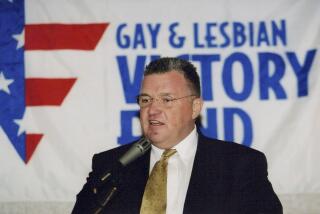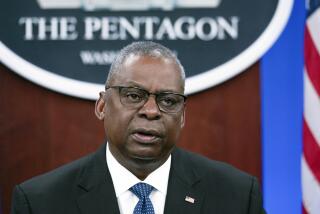James D. Watkins dies at 85; retired admiral led AIDS, ocean panels
Navy Adm. James D. Watkins was considered “an unlikely hero” after he was called out of retirement in 1987 to accomplish what many considered a near-impossible task — taking over the leadership of an embattled and divided presidential commission on AIDS.
A former chief of naval operations, Watkins was a deeply religious Roman Catholic father of six who had once called the military’s ban on homosexuals “a sound policy.” Yet he was also known as an independent and analytical thinker.
Asked by the Reagan administration to formulate a national strategy to deal with the AIDS epidemic, the commission united under Watkins’ new leadership, releasing a 1988 report that was widely praised for its ambitious healthcare initiatives and its compassion.
“It was vintage Jim Watkins,” Adm. William J. Crowe Jr., then chairman of the Joint Chiefs of Staff, told The Times in 1988. “He learned everything he could about it, analyzed it, then divided it up into manageable areas. It’s just the kind of thing he does so well.”
Watkins, 85, who was secretary of Energy under President George H.W. Bush, died Thursday at his home in Alexandria, Va. He had been in declining health in recent years, said his brother, John.
After taking charge of the Energy Department in 1989, Watkins launched the first program to clean up pollution at the nation’s nuclear plants and spearheaded the administration’s energy legislation.
Bush acknowledged choosing Watkins in part because of a background in nuclear energy that included serving under Adm. Hyman Rickover, who guided the Navy’s development of nuclear propulsion in the early 1970s. The two grew close, and when Rickover died in 1986 Watkins gave the eulogy.
“The Navy changed me,” Watkins told The Times in 1988. “Rickover had an intense interest in getting involved with the best and the brightest, and he drove it very hard.... He got me to understand the importance of education and doing everything you can to measure up to your God-given potential.”
At the Energy Department, Watkins also developed a 10-point plan to strengthen environmental protection and waste management activities in the agency, and instituted policy designed to decrease American dependence on foreign oil. He left the post in 1993.
During his 37-year naval career, he rose to chief naval officer and was known for developing a maritime strategy for dealing with the Soviet Union and for improving the lives of those serving in the Navy and their families, according to Jonathan Greenert, chief of naval operations.
“Watkins was an innovative thinker,” Greenert said, “who pushed our Navy forward.”
The sixth of seven children, James David Watkins was born March 7, 1927, at home in Alhambra.
His grandfather George Clinton Ward was president of Southern California Edison in the early 1930s, and his father, Edward Francis Watkins, owned the Southern California Winery Co. and grew grapes in what is now San Marino. After losing his ranch during Prohibition, his father went to work for Edison.
James Watkins once said his mother, Louise, was a woman 30 years ahead of her time. In 1938, she unsuccessfully sought the Republican nomination for Senate.
After receiving a bachelor’s degree from the U.S. Naval Academy in 1949, Watkins served on submarines during the Korean and Vietnam wars. In 1958, he earned a master’s degree in mechanical engineering from the U.S. Naval Postgraduate School in Monterey.
By the late 1970s, Watkins was commander of the 6th Fleet and in the early 1980s served as commander in chief of the Pacific Fleet.
At the Pentagon, he was known as a free, if conservative, spirit who was nicknamed “Radio Free Watkins.”
“He was strong. If you told him something, you better have done your homework,” said John, who is his last surviving sibling and lives in Pasadena. “He would listen, but you better know what you were talking about.”
In 2001, Watkins began chairing another presidential commission, with a mandate to establish a comprehensive national ocean policy. Three years later, the grim report by the U.S. Commission on Ocean Policy gave nearly 200 recommendations to President George W. Bush. They included urging the government to curtail pollution and control coastal development to nurse ailing waters back to health.
“Everyone agrees the oceans are in trouble,” Watkins told The Times in 2004, referring to the 16 panel members. “We know if we don’t get moving now, in 10 years we may not be able to recover.”
In 1950, he married Sheila Jo McKinney, the daughter of a rear admiral. Her career, she later said, was to follow her husband around the world and raise their six children, often alone while moving 32 times during his Navy years. She died of cancer at 67 in 1996.
Watkins’ survivors include his wife of 12 years, Janet; six children from his first marriage, Katherine Coopersmith, Laura Jo Kauffmann, Charles Watkins, Susan Watkins, James D. Watkins Jr. and Edward Watkins; 11 grandchildren; and four great-grandchildren.
More to Read
Start your day right
Sign up for Essential California for the L.A. Times biggest news, features and recommendations in your inbox six days a week.
You may occasionally receive promotional content from the Los Angeles Times.




















































